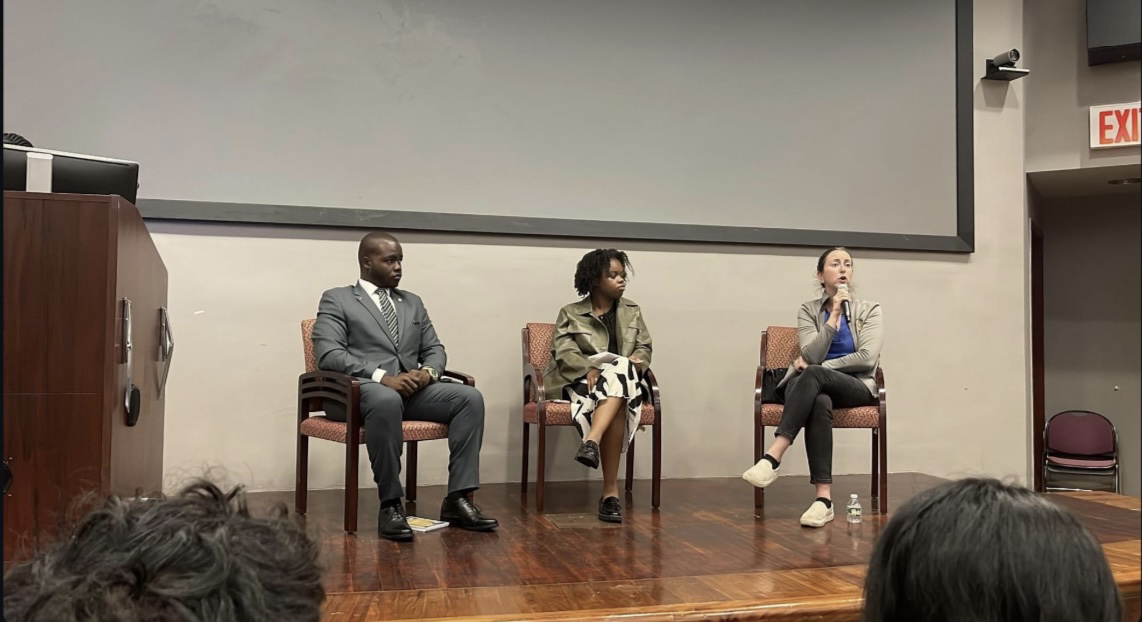“We seek change in a dignified way through the ballot box,” stated New York State Lieutenant. Governor Antonio Delgado at the “Youth Votes Matter” event held on Monday, Sept. 16th, in the Benjamin S. Rosenthal Library. The event was hosted by the Percy E. Sutton SEEK Program’s Generation Leaders, a student-government organization that advocates for the SEEK educational opportunity program.
The event featured former Generation Leaders President Zaire Couloute, and New York Assembly members Khaleel M. Anderson and Nily Rozic. It also saw appearances from Lt. Governor Delgado and Queens College President Frank Wu. The event addressed student concerns about voting in the upcoming election this November and highlighted local and state legislation.
The discussion answered students’ questions about local and state policies, including the MTA, domestic violence, environmental racism, and legislation that aims to make voting more accessible for students.
Anderson, a SEEK alum himself, spoke about a bill he sponsored known as the Purple Alert law.
“Women, typically women of color, go missing and it takes a really long time for law enforcement and all the various entities to respond and get involved,” Anderson said.
The bill seeks to close the gap in response time by sending a purple alert to authorities so they can address the situation quicker. This policy is paired with another policy Anderson sponsored, known as the Destini Smothers law, named after Destini Smothers — a domestic violence victim who went missing in 2021.
Rozic addressed a bill she plans to pass by next year with the purpose of allowing 17-year-olds to register to vote in a primary if they turn 18 before the general election in November.
“It’s like muscle memory. Once you start voting, and voting early or voting in primaries, you’re going to keep doing it,” Rozic said.
The panel also addressed Project 2025, a conservative political project that promotes policies in several areas of state and federal politics that has sparked debate between voters.
“It is such a big threat to our reproductive freedom, you need to have skin in the game and you need to go out and vote,” Rozic said when asked about the severity of Project 2025.
Anderson also mentioned Schedule F, an executive order under Project 2025 that removes protections for civil servants deemed disloyal to the president and promotes loyalty to the president in hiring practices.
He explained that appointments by legislators for staff would be serving at the pleasure of the president rather than the elected officials who would appoint them.
Students attending the event in-person and online asked the panel about student concerns surrounding the election cycle. One such question was about tackling environmental racism, to which Anderson proposed a policy that taxed airlines for their contribution to pollution in several areas within Queens.
The extra fees would “ensure that money is available for communities for harm litigation and reduction where airliners are polluting the air.” Anderson also described an effort to help NYC Housing Authority (NYCHA) residents living near construction plants, mandating air-quality testing by the New York Department of Health.
After the event had closed, students voiced their opinions and grievances, and we were able to reach out to those who personally asked questions to the panel to see if the answers they received were satisfactory.
The Knight News spoke to SEEK sophomore Sabicun Hussain, a Psychology and Political Science major, who asked the panel if they had any plans to address the criminalization of poverty after a suspect of fare evasion and two bystanders were shot by a police officer on the L train in Brownsville, Brooklyn in late-September.
“Currently, $2.90 per ride for a CUNY student adds up to about $44 [per week]. However, when he stated that the affordability program for New Yorkers who are eligible for lower fares, he stated that it goes down to $1.45. $23 per week for CUNY students who cannot afford books and other supplies,” Hussain responded.
“SEEK is a legislative program. We have to be connected to the stakeholder. We have to hold the stakeholder accountable and we need to know what the stakeholder is doing to help our communities,” stated director of the SEEK program, Norka Blackman-Richards, after the event.
The event was a major success, turning out a full audience of 253 eager students ready to learn about how they can engage civically in local and state elections.











